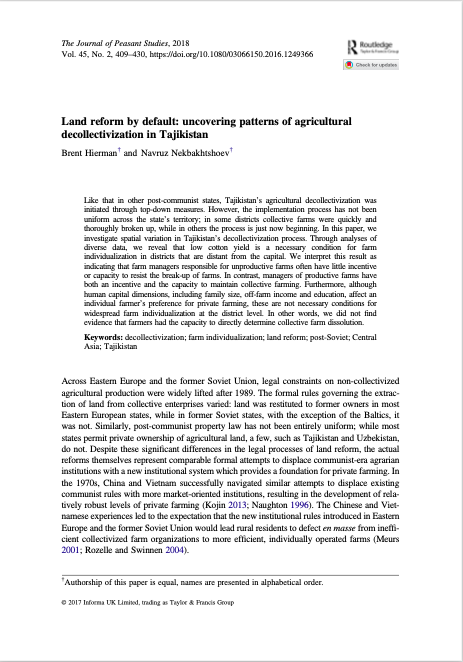Location
A leading journal in the field of rural politics and development, The Journal of Peasant Studies ( JPS) provokes and promotes critical thinking about social structures, institutions, actors and processes of change in and in relation to the rural world. It fosters inquiry into how agrarian power relations between classes and other social groups are created, understood, contested and transformed. JPS pays special attention to questions of ‘agency’ of marginalized groups in agrarian societies, particularly their autonomy and capacity to interpret – and change – their conditions.
The Journal encourages contributions from across the social sciences which:
-
question mainstream prescriptions;
-
interrogate orthodoxies in radical thinking;
-
explore theoretical, policy and political alternatives.
The Journal welcomes contributions on a wide range of contemporary and historical questions and perspectives related to rural politics and development; on issues that confront peasants, farmers, rural labourers, migrant workers, indigenous peoples, forest dwellers, pastoralists, fisherfolk and rural youth – both female and male – in different parts of the world.
In addition to articles and special issues, the Journal publishes Grassroots Voices – views that are written and presented in a non-academic style but provide important insights and information relevant to critical rural development studies; and Reviews of important theoretical or policy-oriented books or films written for diverse audiences. For more information about Grassroots Voices and Reviews, see here.
JPS was founded in 1973 on the initiative of Terence J. Byres and its first editors were Byres, Charles Curwen and Teodor Shanin who are among the most important agrarian political economists.
Members:
Resources
Displaying 11 - 15 of 21Gender and generation in engagements with oil palm in East Kalimantan, Indonesia: insights from feminist political ecology
Across many parts of Indonesia, investment in oil palm has brought accelerated forms of land acquisition and market engagement for communities, signalling far-reaching implications for equity and well-being of current and future generations. This paper uses a conjunctural feminist political ecology approach to explore gendered and generational engagements with oil palm in Indonesia.
Land reform by default: uncovering patterns of agricultural decollectivization in Tajikistan
Like that in other post-communist states, Tajikistan’s agricultural decollectivization was initiated through top-down measures. However, the implementation process has not been uniform across the state’s territory; in some districts collective farms were quickly and thoroughly broken up, while in others the process is just now beginning. In this paper, we investigate spatial variation in Tajikistan’s decollectivization process.
‘Like gold with yield’: evolving intersections between farmland and finance
Since 2007, capital markets have acquired a newfound interest in agricultural land as a portfolio investment. This phenomenon is examined through the theoretical lens of financialization. On the surface the trend resembles a sort of financialization in reverse – many new investments involve agricultural production in addition to land ownership. Farmland also fits well into current financial discourses, which emphasize getting the right kind of exposure to long-term agricultural trends and ‘value investing’ in genuinely productive companies.
The politics of evidence: methodologies for understanding the global land rush
The most recent ‘land rush’ precipitated by the convergent ‘crises’ of fuel, feed and food in 2007–2008 has heightened the debate on the consequences of land investments, with widespread media coverage, policy commentary and civil society engagement. This ‘land rush’ has been accompanied by a ‘literature rush’, with a fast-growing body of reports, articles, tables and books with varied purposes, metrics and methods. Land grabbing, as it is popularly called, is now a hot political topic around the world, discussed amongst the highest circles.
The Long Green Revolution
To combat climate change and hunger, a number of governments, foundations and aid agencies have called for a ‘New Green Revolution’. Such calls obfuscate the dynamics of the Green Revolution. Using Arrighi's analysis of capital accumulation cycles, it is possible to trace a Long Green Revolution that spans the twentieth and twenty-first centuries.




